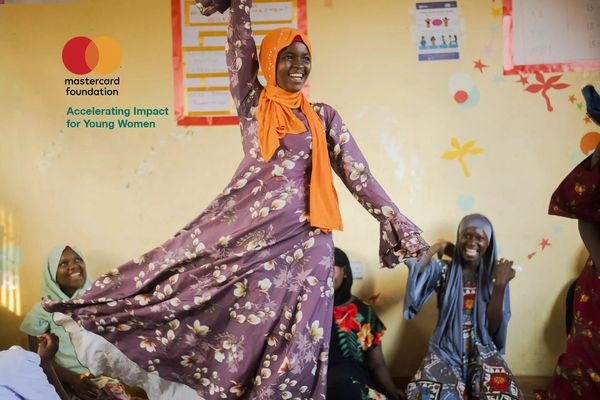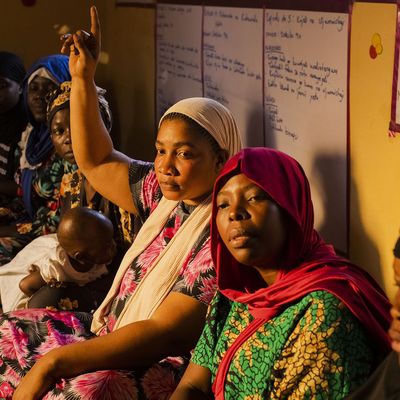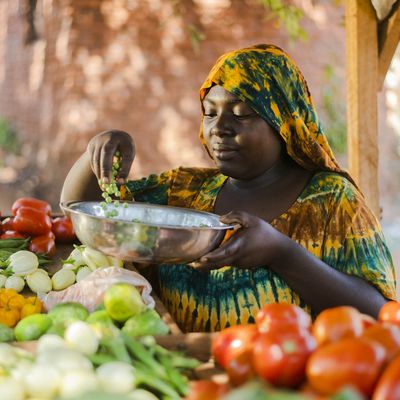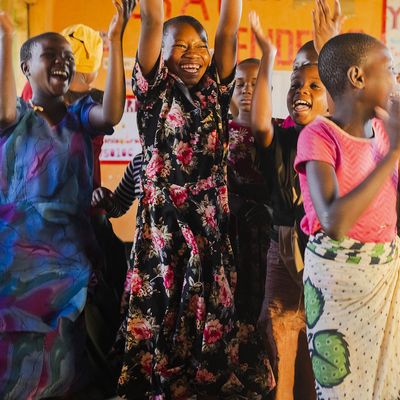The Mastercard Foundation Accelerating Impact for Young Women (AIM) in Partnership with BRAC is equipping 1.2 million adolescent girls and young women with age-appropriate entrepreneurship training, employability skills, and life-skills education, as well as the tools to start and scale their own businesses
Over five years, AIM provides the knowledge, resources, and confidence young women need to start and grow businesses, access decent work, and break cycles of poverty. (reinforcing BRAC's systems approach)
Building on BRAC’s proven youth empowerment model—spanning microfinance, agriculture, vocational training, and skills development—AIM creates pathways to long-term opportunities and inclusive economic growth. The program is currently operating in Sierra Leone, Liberia, Uganda, Tanzania, and Rwanda, advancing gender equality and equipping the next generation of women leaders across Africa
Specifically, the program will enable:
- Girls aged 12-17 to stay in or return to school, and to access life skills training, confidence building, peer support groups, and gain basic financial literacy.
- Girls and young women aged 15-17, who are unable to go to school due to reasons such as pregnancies or childcare, to gain confidence and receive livelihood training.
- Program participants aged 18-35, to receive life skills and social empowerment training, with a focus on livelihood and entrepreneurial activities. Selected participants will be equipped with inputs to start new businesses, microloans to grow their businesses, and links to savings groups and market actors.
Anticipated reach
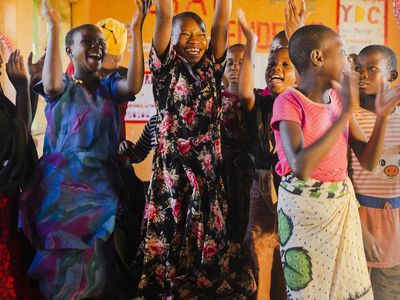
1.4+
Adolescents
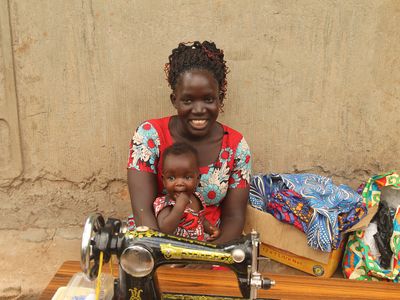
1.9 M
Households
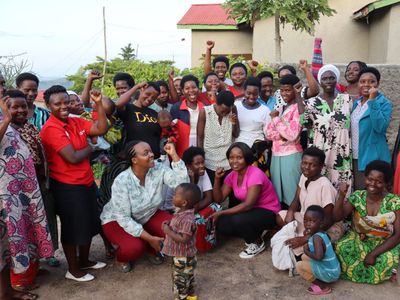
7
Countries
ANTICIPATED IMPACT
Directly improve the lives of 1.2 million participants across seven countries, and work with them and their allies to drive an enabling environment for girls and young women to thrive.
The program will see:
- Participants gain confidence to exercise their agency (understand their choices and practice informed decision-making) through delivery of training and access to youth-friendly sexual and reproductive health and rights (SRHR), psychosocial and protection services.
- Reduced incidences of gender-based violence, including teenage pregnancy, as adolescent boys and young men become supportive allies of AGYW.
- Participants gain market-relevant skills, and build sustainable livelihoods by accessing training, resources, networks, and markets.
- Participants are empowered to advocate for their rights, and access decision-making platforms to influence policies and practices that affect them.
Components
Results so far
5600+
female and male mentors
320K+
club participants
119K+
young women trained on financial literacy
122
early childhood development micro-entrepreneurs
Our work
Clubs
Clubs are safe spaces, each with two mentors serving, on average, 100 participants in four groups of 25 members- very young adolescent girls, young women, and adolescent boys and young men. Clubs are located within the community they serve and schedules are determined by their members. The clubs will host regular sessions with members, including dedicated sessions with families and partners, cross-gender dialogues, savings group activities, etc. In the sessions, the participants build their life skills through a comprehensive age-specific curriculum.
Creating linkages
Creating Linkages for adolescent girls and young women to existing service providers of critical services needed by the AGYW. These services include and are not limited to; youth friendly sexual and reproductive health, gender-based violence (GBV), child protection, psychosocial services and market linkages, especially in the rural or remote communities where access to markets is limited.
Educational Support
Educational support for adolescent girls and young women to help them continue their education. The program believes that education is a great means for the participants to an improved quality of life. The educational support is majorly targeted to the participants in school, at risk of dropping out of school and those who had dropped out of school.
Focus on inclusion
Focus on Inclusion for groups who are underserved and left behind, such as those living in extreme poverty, young people with disabilities, and those living in a situation of displacement such as refugees and internally displaced persons (IDPs). Program provides reasonable accommodation and modifies interventions to meet their special needs.
Livelihood support
Livelihood support where adolescent girls, and young women eligible to engage in income-generating activities are linked to livelihood opportunities along four major pathways. The livelihood pathways are shaped by a comprehensive market system and value chain analysis which identifies in-demand skills, trades, and value chains. The participants take one of the following livelihood pathways to realize decent work and sustainable livelihoods: 1. Community-based livelihoods on market-viable agri-enterprises (such as climate-smart agriculture and livestock management) 2. Entrepreneurship (including non-farm community-based livelihoods and childcare enterprises) 3. Vocational skills training in gender-transformative sub-sectors through technical and vocational education and training (TVET) institutions 4. Apprenticeships where adolescent girls and young women are placed with a master craftsman and later supported into job placements. The program creates LINKAGES for adolescent girls and young women (AGYW) to existing service providers of critical services needed by the AGYW. These services include and are not limited to; youth friendly sexual and reproductive health, gender-based violence (GBV), child protection, psychosocial services and market linkages, especially in the rural or remote communities where access to markets is limited.
Market development
Market Development to boost the livelihood support activities which may not be enough to ensure adolescent girls and young women (AGYW) are able to grow their enterprises and meet their true potentials. Especially in the rural or remote communities where markets are underdeveloped or access to markets is limited. The program delivers specific interventions to ease the barriers faced by AGYW while accessing market opportunities. Such interventions include market actor and private sector engagement, market facilitation, and training AGYWs as to provide agriculture and livestock extension services in the community.
Mentors
Mentors are young women and men who are rigorously trained to deliver the curriculum, manage the clubs and receive an honorarium for their work. A female mentor facilitates three age groups of AGYW through their club, and a male mentor facilitates a group of ABYM in their club. Mentors are selected from the local community, based on their strong interpersonal skills, ability to read and write, and positive social standing in the community. Beyond the club, they are role models who help connect members to resources in the community.
Transitions
Transitions most of the participants into ongoing empowerment collectives/groups in order to sustain the impact and promote sisterhood and brotherhood. These transitions may include connections to other locally existing programs including BRAC Microfinance (for eligible participants) or forming of self-governing groups to be run by the participants e.g. VSLAs.
Village savings and loan associations
Villages savings and loan associations are saving groups that are formed within the clubs for girls and women aged between 15 to 35 who are engaged in livelihoods, to build a savings culture and provide them with a safe space to save and avail small credits from the pooled funding to invest or meet emergency needs. The groups are optional for those who want to engage and can commit to the agreed upon savings amount the group sets.
Youth development committees
Youth development committees are formed with community members, including community leaders, professionals, persons with disabilities (PWDs) and youth participants, to promote a sense of guardianship of each club’s participants. They play a key role in protecting and promoting young people’s rights and wellbeing – following up on attendance, helping to prevent incidences of gender-based violence and support for survivors, resource mobilization for emergencies, and establishing links to social services, marketing opportunities, and local advocacy.
